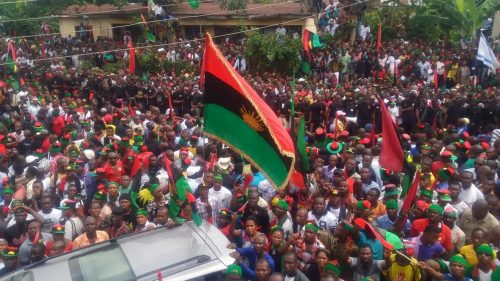Despite the suspension of the sit-at-home order in the South-East by the proscribed Indigenous People of Biafra, activities were grounded in some parts of the region.
This was as the IPOB made a U-turn and threatened to recommence the ‘every Monday’ sit-at-home protest starting from August 23.
Banks, schools, shops, and other businesses did not open for work in many parts of Abia, Ebonyi, Imo and Anambra states, while traders and other business concerns opened in Enugu State.
Though one of the reasons for the absence of normal activities in four out of the five southeastern states was that many were not aware of the suspension of the sit-at-home order, others genuinely closed shops in solidarity with the IPOB leader.
In Abakaliki, the Ebonyi State capital, commercial banks, and other businesses remained shut as the sit-at-home order was observed irrespective of the suspension of the directive.
One of our correspondents, who monitored the situation, gathered that banks, motor parks, filling stations, eateries, major shops, and supermarkets remained closed in the state capital.
Also affected were shops at the Abakaliki International market and Ophoke-Abba market in Kpiri-Kpiri, where shop owners shut down businesses.
Major roads including the Abakaliki/Enugu; Abakaliki/Afikpo highways and other major busy internal roads like Afikpo and Ogoja roads were scanty with human and vehicular movements.
A trader, Mr Simon Ngaji at Ophoke-Abba Market, Kpiri-Kpiri explained that people, especially shop owners in the market did not receive the news of the suspension, while some doubted its authenticity.
In Umuahia, the Abia State capital, there was no visible movement of security operatives, as schools were closed, except for those conducting NECO and WASC examinations.
In Aba, a middle-aged man was shot dead at Gas Line by Express.
This was confirmed in a statement by the Coalition of South-East Youth Leaders.
The coalition condemned “the gruesome killing of an unarmed innocent youth at Gas Line by Nigerian soldiers”.
In the statement by Goodluck Ibem, the President General, and Kanice Igwe, the Secretary-General, the body further stated, “We call on Nigeria authorities to order a prompt, independent and impartial inquiry into the killing by the army, identify suspected perpetrators and ensure that they are brought to justice without delay.”
Similarly, banks, business centers, eateries failed to open on Monday in Owerri, the Imo state capital, despite the cancellation of the weekly sit-at-home order by IPOB.
We monitored activities on Monday morning in the state capital and observed that streets and roads were deserted.
Few persons, who came out, found it difficult to get vehicles that could convey them to their destinations.
Major markets like Nkwo-Orji, Alana international market, Ekeukwu Owerri, Amakaohia, and Akwakuma markets were almost empty.
The ever-busy Imo State University Roundabout, Government House Roundabout, Cherubim junction, Control Post Roundabout, Warehouse Roundabout, Emmanuel College Roundabout, and Fire service Roundabout all in Owerri were also deserted.
Also, Owerri to Orlu, Onitsha, Port Harcourt, Okigwe, Mbaise, and Aba roads were all deserted by motorists and passersby, while shops and motor parks were closed.
An artisan, who spoke with The PUNCH, said, “I am not going anywhere; I will stay at home today because my life is more important to me. They may be telling us that the sit-at-home order has been cancelled so that we will come out and be harmed. One day with my family will not kill me.”
Nothing changed in Anambra despite the suspension of the exercise, as socio-economic activities were grounded in Awka, Onitsha, Nnewi and other major towns in the state.
One of our correspondents, who monitored the situation in the state, observed that banks, markets, shops, government establishments and other businesses were shut down.
A resident, who gave his name as Okechukwu Madu, said, “I heard on the Radio Biafra that there was nothing like suspension of the sit-at-home. We want the exercise to continue till Kanu is released.”
In a related development, the IPOB has threatened to recommence the ‘every Monday’ sit-at-home protest, starting from August 23.
The group had suspended the weekly protest meant to prevail on the Federal Government to release their leader, Nnamdi Kanu, who is in detention over allegations bordering on treasonable felony.
IPOB, while suspending the protest last week, said the exercise would only hold on the days Kanu would appear in court.
But the Media and Publicity Secretary of the secessionist group, Emma Powerful, said the group might recommence the exercise, starting from next Monday.
He said, “IPOB is no longer forcing anyone to stay at home, but our people are voluntarily doing so to show how they feel and value our leader. That will make us to continue with the exercise from next week.
“If we begin again, even an ant will not be allowed to be seen on any road or street in Biafra land in any of the protest days, unless that idiot (defaulter) has written his or her will.”

 BIG STORY5 days ago
BIG STORY5 days ago
 BIG STORY2 days ago
BIG STORY2 days ago
 BIG STORY2 days ago
BIG STORY2 days ago
 BIG STORY4 days ago
BIG STORY4 days ago
 BIG STORY3 days ago
BIG STORY3 days ago
 BIG STORY4 days ago
BIG STORY4 days ago
 BIG STORY2 days ago
BIG STORY2 days ago
 BIG STORY2 days ago
BIG STORY2 days ago
























